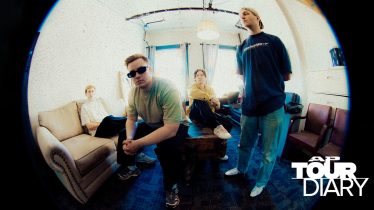5 Things We Learned From Mayday Parade’s New Documentary
Nearly 10 years ago, a little EP called Tales Told By Dead Friends shook up the DIY scene—ultimately selling more than 50,000 copies without any backing from a label—and a certain Tallahassee-based quintet took emo to soaring new heights and made “such a simple little whore” an iconic phrase fans still sing along to. The term “emo” is still often misunderstood, but when it comes to being downright “emo”-tional, Mayday Parade have it on lock. Why? They are masters of seamlessly mixing their recognizable, gut-wrenching and emotionally-charged lyrics with heavy-handed guitar riffs that leave listeners feeling like their hearts have been grabbed straight out of their chests. Maybe it’s masochistic, but people enjoy listening to heartbreaking music. There’s something about the truthfulness behind the broken, and Mayday Parade know just how to transfer the fragileness of the human condition into song. Mayday Parade have their footing more firmly planted than ever before and showcase their talent, and more importantly their happiness, on their latest effort Black Lines—an album that is impeccably raw, closely personal, a bit unexpected yet undeniably Mayday.
To accompany the new album and commemorate their decade-long career, Mayday Parade crafted a nostalgic documentary—appropriately titled Three Cheers For 10 Years, which pays homage to the group’s humble beginnings and the EP that changed everything. Naturally, we decided to watch it. Here’s our takeaway:

1. They can grow some serious beards.
But really—what did you expect from putting five Southern boys in a cabin in the woods for an extended period of time? Beards are a popular trend these days, and the guys in Mayday Parade show they’ve got the facial hair game mastered, as well. Everyone should grow beards like that at least once in their lives.

2. They made selling CDs in line at Warped Tour actually work.
Gone are the days of up-and-coming bands carrying around Sony Walkmans and convincing eager concertgoers to check out their music and buy physical copies of their albums. We live in the digital age now (a glorious time of Spotify’s “Discover Weekly” playlists and digital downloads) but Mayday Parade had the daunting task of promoting their band right on the brink of social media’s revolutionary birth (aka MySpace) which meant the guys still needed boots on the ground. Literally: To follow Warped Tour and pass out CDs to people in line. (Does this still happen? Is it even allowed anymore?) Nonetheless, Mayday Parade made it work and found themselves playing the tour shortly after their grassroots soliciting days.

3. They might have been cheerleaders in a past life.
We all know Florida State University is Mayday Parade’s go-to pick when it comes to college universities and, more specifically, college football. But, who knew vocalist Derek Sanders participated in FSU cheer camp? Maybe he did. Maybe he didn’t. Could be a friend’s t-shirt he borrowed. It should also be noted he’s got a great set of pipes that could have been an asset to any cheer squad. We may never know for sure, but the thought is amusing. Go Noles!

4. They have always made mic slingin’ and guitar swingin’ look good.
For anyone who has attended one of Mayday Parade’s high-energy shows, you’ve undoubtedly noticed the flawless guitar swinging done by guitarists Alex Garcia and Brooks Betts, and bassist Jeremy Lenzo in addition to Sander’s microphone slinging. Well, this isn’t new. In various clips recorded during the band’s career and incorporated throughout the documentary, the five-piece prove they’ve kind of always had the stage presence thing down, too.
5. They are happy and aren’t going anywhere.
Now free of certain pressures woven into the earlier part of their career, Mayday Parade have found a place that makes them truly happy. “Of course, I guess there’s some part of me that worries a little bit or is, you know, kind of anxious to see what people think,” Sanders reveals in the documentary intro. “I really feel like over the years we’ve learned that we just got to go in and make the album that we’re happy with—just make the music that we love.” Sanders goes on to say the bottom line is the band wanted to make the album they are happiest with—and “Black Lines” achieved just that. Garcia echoes Sanders’ sentiments by saying the band can now be their authentic selves and no longer feel forced to fit in a certain mold laid out for them by others. “I feel like now, as we feel a little more established, you know, it’s been 10 years, and we feel like we can relax a little,” Sanders concludes. “We’re not gonna go anywhere tomorrow. We’re not gonna disappear, so it feels like we’re able to have more freedom with it—have more fun with it.”







